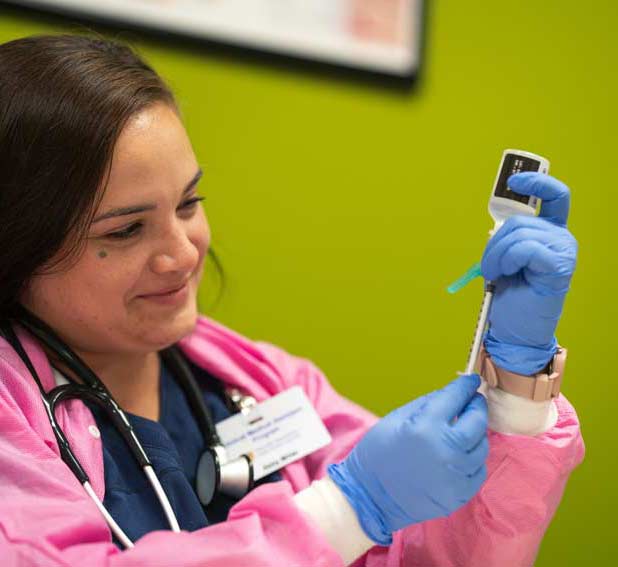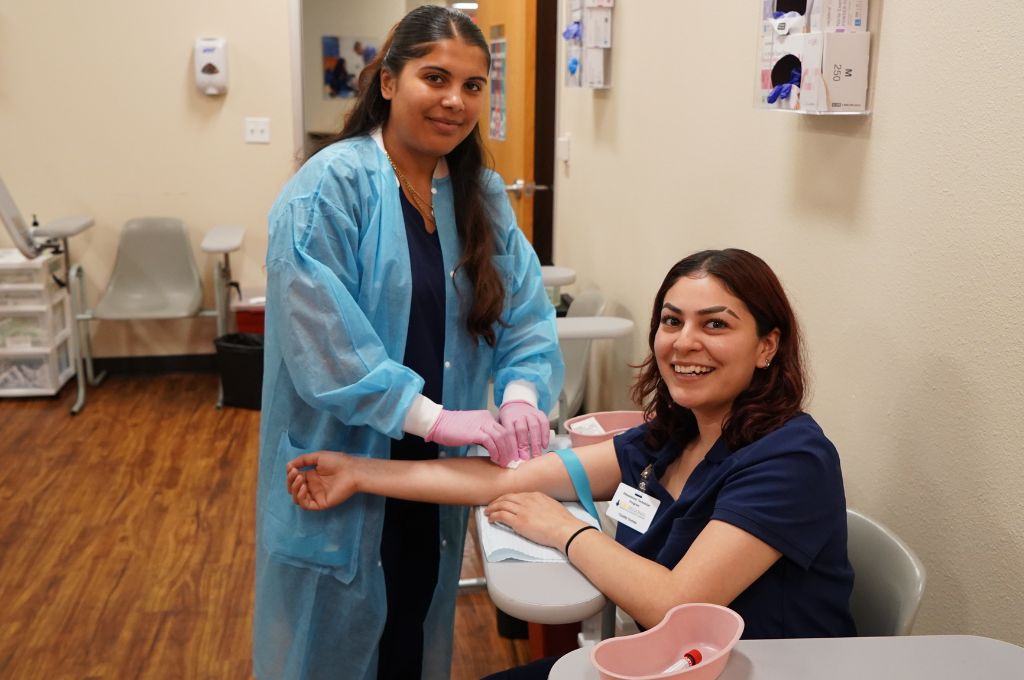Phlebotomy Classes Near Me: What Supplies You’ll Need
Wiki Article
The Path to Accreditation: Comprehending the Phlebotomy Educating Program Trip and Its Importance
As you consider the path to qualification in phlebotomy, it's crucial to recognize the duty you'll play in medical care. Your training will certainly cover vital skills, from blood collection techniques to patient interaction.
The Role of Phlebotomists in Health Care
Phlebotomists play an essential role in the healthcare system, acting as the crucial link in between patients and essential diagnostic screening. You'll do blood attracts, making certain examples are accumulated properly and securely. Your expertise assists in identifying clinical conditions, keeping an eye on health, and guiding therapy choices.In your daily communications, you'll need to develop trust fund with clients, making them really feel comfy throughout what may be a demanding experience. You are in charge of labeling and managing samples meticulously to stop contamination or errors, which could affect examination results.
Past this, you'll frequently function together with medical professionals and nurses, communicating crucial information concerning people' conditions. Your duty is essential in maintaining the workflow in healthcare setups, ensuring timely and accurate results. By grasping your skills, you add meaningfully to individual treatment, making you a crucial part of the medical team. Embracing this obligation is key to your success as a phlebotomist.
Introduction of Phlebotomy Training Programs
When checking out phlebotomy training programs, you'll discover different kinds created to fit various routines and discovering styles. Each program aids you develop crucial abilities like blood collection and individual communication. Recognizing these options is essential to choosing the right course for your occupation.Types of Educating Programs
Numerous kinds of training programs are offered for those wanting to come to be skillful in phlebotomy. You can select from certificate programs, which usually last a couple of months and focus on vital abilities. There are also diploma programs that provide a more extensive education and learning, commonly lasting approximately a year. If you're searching for a much deeper understanding, an associate level in a related field could be the best fit. On the internet programs provide flexibility for those balancing work or household commitments, enabling you to examine at your own speed. Furthermore, some medical facilities and centers use on-the-job training programs, supplying practical experience while you discover. Whatever path you choose, each program aims to outfit you with the necessary abilities for a successful phlebotomy occupation.
Secret Abilities Created
Mastering phlebotomy calls for a set of key abilities that are created with comprehensive training programs. Additionally, communication skills are basic; you'll need to communicate with clients, clarify treatments, and placed them at convenience. Each of these abilities is essential for your success as a licensed phlebotomist, making you a beneficial asset in any kind of healthcare setting.Key Parts of a Phlebotomy Course
In a phlebotomy training course, you'll concentrate on vital topics that prepared for your future profession. You'll take part in hands-on training that permits you to apply what you've found out in real-world settings. Both the core curriculum and sensible experience are crucial for your success as a phlebotomist.Curriculum Summary
While going after a phlebotomy training program, you'll encounter a curriculum made to furnish you with fundamental abilities and expertise. Phlebotomy Courses Near Me. This educational program normally consists of makeup and physiology, concentrating on the circulatory system and comprehending blood components. You'll also learn around different sorts of blood collection approaches, including venipuncture and capillary puncture methodsAdditionally, infection control and safety protocols are crucial components, ensuring you recognize exactly how to maintain a sterile setting. You'll research patient interaction, emphasizing communication and empathy, which are critical for reducing client anxiety.
Hands-On Training Experience
Obtaining hands-on Phlebotomy Courses Near Me experience is a vital component of your phlebotomy training program. This sensible training permits you to apply what you've found out in a real-world setup, enhancing your abilities and confidence. Phlebotomy school.In addition, you'll get the opportunity to engage with people, which is important for establishing your communication abilities. This mix of technological efficiency and social abilities is important for your success as a qualified phlebotomist. Eventually, hands-on training is where theory satisfies practice, solidifying your expertise and readiness for qualification.
Accreditation and Licensing Requirements
Before you can start your job in phlebotomy, it is crucial to understand the accreditation and licensing demands that differ by state. The majority of states need phlebotomists to hold an accreditation from an identified organization, such as the National Phlebotomy Organization or the American Society for Professional Pathology. These accreditations generally include passing a test that checks your expertise and skills in the field.Along with qualification, some states have details licensing requirements. You might need to finish a certain variety of hours in scientific method, send proof of training, or undertake a background check. It is very important to investigate your state's regulations to see to it you meet all essential requirements.
Remaining educated concerning these needs not just helps you safeguard a placement but additionally boosts your credibility as an expert. By satisfying these requirements, you'll be well on your way to a successful job in phlebotomy.
Hands-On Training and Practical Experience
Hands-on training and practical experience are essential elements of your phlebotomy education, as they allow you to apply academic understanding in real-world situations. Throughout your training, you'll take part in supervised venipuncture, find out proper techniques, and become accustomed to numerous blood collection tools. This direct involvement is vital for developing your confidence and developing your abilities.You'll work very closely with knowledgeable experts who can lead you through the subtleties of patient interaction and sample handling. Each practice not just reinforces your understanding but also prepares you for the hectic environment of healthcare settings.
Additionally, lots of programs integrate medical turnings, allowing you to experience diverse settings, from healthcare facilities to outpatient centers. This direct exposure assists you adjust to various challenges and individual needs, guaranteeing you're well-prepared for your future function. Accept these opportunities, as they're necessary to becoming a qualified and caring phlebotomist.
Obstacles Dealt With Throughout Training
While getting hands-on experience is vital, it's important to identify the difficulties that can arise during your phlebotomy training. Furthermore, mastering the abilities required for blood draws takes practice; you may battle with technique at first.Time administration can likewise be a difficulty, as balancing concept, functional sessions, and individual commitments can feel challenging. You might deal with differing finding out speeds amongst your peers, resulting in sensations of insecurity if you think you're falling behind. Adapting to the various individualities of instructors can be tough, as each might have a special training design.
Recognizing these challenges early on can prepare you for success and help you create durability throughout your training journey.
Occupation Opportunities After Accreditation

As you get experience, you could also consider specializing in locations like pediatric or geriatric phlebotomy, satisfying details patient requirements. Some phlebotomists select to progress their occupations by coming to be research laboratory specialists or going after more education and learning in medical care fields.
Furthermore, your certification can result in functions in training or monitoring new phlebotomists, permitting you to share your knowledge. With the health care market continuously growing, your skills will always remain in need, leading the way for a secure and satisfying occupation. Embrace the possibilities awaiting you!
Frequently Asked Questions
What Is the Typical Period of a Phlebotomy Training Course?
Phlebotomy training programs usually last around four to 8 weeks. You'll take part in hands-on practice, classroom instruction, and on the internet knowing. Finishing this training prepares you for qualification and a gratifying job in health care.Are Online Phlebotomy Courses Available?
Yes, online phlebotomy training courses are available. They offer flexibility and comfort, enabling you to examine at your very own pace. Just validate the program is accredited to fulfill certification requirements and gain important abilities for your profession.Just How Much Does Phlebotomy Training Normally Price?
Phlebotomy training typically sets you back in between $700 and $2,500, depending on the program and location. You should think about variables like program length, included products, and hands-on experience when selecting the ideal training for you.What Are Typical Prerequisites for Phlebotomy Training?
Common requirements for phlebotomy training frequently include a senior high school diploma or GED, immunizations, and a history check. Some programs may also need standard health care understanding or certifications, ensuring you're prepared for hands-on training.Can I Work While Completing My Phlebotomy Training?
Yes, you can function while finishing your phlebotomy training. Numerous trainees balance tasks with their researches, but make particular to manage your time efficiently to guarantee you meet both job and training dedications effectively.Report this wiki page